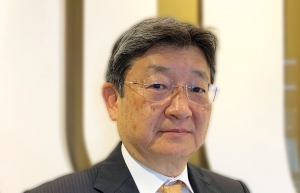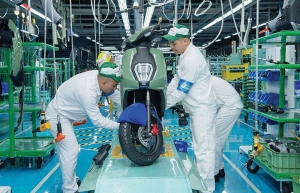Expectations high for Japanese groups in Vietnam
Haruhiko Ozasa, chief representative of the Japan External Trade Organization in Hanoi, spoke to VIR’s Phuong Thu about the significance of fostering stronger links between Vietnamese and Japanese supporting industries amid shifting global supply chains.
 |
| Haruhiko Ozasa, chief representative of the Japan External Trade Organization in Hanoi |
What is the significance of connecting Vietnamese and Japanese supporting and manufacturing industries through trade promotion?
For Japanese companies, expanding transactions with Vietnamese companies offers benefits such as cost reduction through local procurement and diversification of supply chains. For Vietnamese companies, doing business with Japanese firms provides opportunities to participate in global supply chains.
In terms of the Vietnamese economy, promoting supporting industries is expected to strengthen the industrial base and supply chains. Amid increasing global economic uncertainty, the importance of enhancing added value within Vietnam is increasing, for example, through high-value-added production rather than relying solely on assembly.
The Japan External Trade Organization (JETRO) aims to contribute not only to the business expansion of Japanese companies but also to the development of Vietnamese companies and the Vietnamese economy.
How do you evaluate the potential for cooperation between Vietnamese and Japanese enterprises in the supporting industry sector, and what are the key technologies or equipment that manufacturing enterprises in Vietnam should prioritise?
According to our survey, just over 50 per cent of Japanese companies wish to expand procurement in Vietnam. The number of Vietnamese companies listed in JETRO’s Excellent Companies Directory has grown from about 100 to over 250, indicating that Vietnam’s supporting industries are gaining strength.
However, Japanese companies still point out challenges in Vietnam’s supporting industries, such as quality, technology, and raw materials. Further growth is expected in the future.
I have high expectations for Vietnam’s highly regarded IT sector. For example, Vietnam produces around 50,000 IT engineers annually, which is internationally valued. In recent years, digital transformation has been progressing in the manufacturing field as well.
Technologies such as the Internet of Things for visualising manufacturing processes, data utilisation, and AI for defect detection are also highly anticipated. By combining Vietnam’s various strengths in IT with manufacturing, I believe Vietnam can develop a unique competitive advantage.
What specific policies or support programmes is JETRO currently implementing for Japanese businesses operating in Vietnam to promote cooperation and effective business development?
We place importance on partnerships between Japanese and Vietnamese companies in our activities, such as local procurement within supporting industries and in innovation areas like startups, which we have recently begun focusing on.
In terms of local procurement, Japanese companies benefit from cost advantages, while Vietnamese companies gain access to global supply chains through Japanese firms. We aim to foster a Japan-Vietnam relationship where both sides grow together through partnerships and use the fruits of that growth to fuel the next stage of development.
 | Japanese groups steadfast in ambition to aid energy goals To achieve carbon neutrality amid growing energy demand in Asia, the Japanese government is willing to cooperate with ASEAN countries like Vietnam to achieve energy transition by providing financial and technical support for the demonstration and introduction of decarbonisation technologies. |
 | Japanese groups accelerate their M&A activities in Vietnam In recent years, dealmaking activities between Vietnam and Japan have grown significantly. Japan has become one of the leading countries investing in Vietnam, with billions of US dollars poured on an annual basis. Japanese capital is now present in 57 out of 63 provinces throughout the country, with major concentrations in Ho Chi Minh City and Hanoi. |
 | Japanese groups eye lucrative arenas Japanese companies and investors are accelerating their growth in the Vietnamese market despite the global economic uncertainty. |
What the stars mean:
★ Poor ★ ★ Promising ★★★ Good ★★★★ Very good ★★★★★ Exceptional
Related Contents
Latest News
More News
- Digital shift reshaping Vietnam’s real estate brokerages (December 31, 2025 | 18:54)
- Allen & Gledhill recognised as Outstanding M&A Advisory Firm (December 18, 2025 | 14:19)
- Inside Lego Manufacturing Vietnam (December 18, 2025 | 11:45)
- The next leap in Cloud AI (December 11, 2025 | 18:19)
- Vietnam’s telecom industry: the next stage of growth (December 11, 2025 | 18:18)
- Five tech predictions for 2026 and beyond: new era of AI (December 11, 2025 | 18:16)
- CONINCO announces new chairman and CEO (December 10, 2025 | 11:00)
- How AWS is powering the next-gen data era (December 09, 2025 | 13:14)
- Outlook in M&A solid for Singapore (December 08, 2025 | 10:31)
- Vietnamese firms are resetting their strategy for global markets (December 05, 2025 | 17:04)

 Tag:
Tag:




















 Mobile Version
Mobile Version